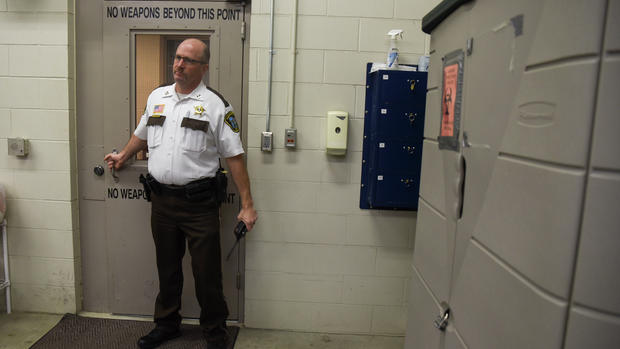WILLMAR—From the control room in the heart of the Kandiyohi County Jail, correctional officer Alii Holt has a video’s-eye view of of the facility: corridors, cell blocks and the outside perimeter.
An array of screens allows Holt and the rest of the jail staff to monitor activity throughout the building. They can track who’s entering and leaving, they can zoom in if they spot the beginnings of an altercation and send officers to respond.
Installation of the new camera system was recently completed, bringing the jail up to date with what Sheriff Dan Hartog called “the latest and greatest” in technology.
“The whole idea behind this is the safety for the correctional officers and the inmates,” Hartog said.
The Kandiyohi County Board, along with a handful of county administrators and the media, recently toured the jail for a firsthand look at the facility and recent improvements.
The new surveillance system, which has been up and running for about a month, was a $450,000 investment.
It’s a significant advancement on the technology that was installed in the jail when the building first opened in 2001, Hartog said.
There are now 150 cameras monitoring strategic locations — almost double the original number of cameras. Images are sharper and more detailed. The tangle of cables that once crowded the control room has been streamlined.
The ergonomics also have been improved. Correctional officers used to have to look upward to monitor all the video screens. Now everything is at eye level and on a work surface that can be raised and lowered, allowing the officer stationed in the control room to stand or sit.
“The system so far has worked great,” Hartog said.
Along with the new surveillance system, the jail also upgraded the relay system that electronically opens and closes the doors.
The $190,000 relay project, which was undertaken this fall, was important for security, Hartog said. “If that goes down, the correctional officers then have to use keys and that becomes a safety issue.”
Funds for the surveillance system and door lock system came from revenue the jail receives for boarding prisoners from other jurisdictions.
The tour took the County Board and administrators into areas of the jail that are not usually visited by the public: the booking area, the gym, the library and the medical unit.
In the near future, a shortage of holding cells will need to be addressed, Hartog said.
The intake area of the jail is increasingly filled with prisoners who have mental health needs but cannot be moved into a more appropriate facility because there often are not enough treatment beds available, he said. Some of these individuals end up staying in a holding cell for weeks, waiting for placement, he said.
Hartog, who is retiring at the end of the year, urged the County Board to take a serious look at the issue.
“I think the conversation should continue about expanding this,” he said. “I think it’s really important that happens.”
West Central Tribune by Anne Polta

